
I speak with up-and-coming software developers often. A couple junior / intermediate software developers work with me at Enterprise Data & Analytics. As I’ve navigated four decades (plus) of software development I have witnessed – and experienced – places on my career-trajectory-map marked, “Here be dragons.”
“I Can Learn All the Things”
“My name is Andy and I am a learning addict.” There are worse things to which one may be addicted (ask me how I know). There are at least two motivations for wanting to learn all the things:
- To “lord it over others.” Some seek power. Some want wealth or fame. Some desire to be the smartest person in the room. It’s easy to judge people with such motivations. I ask you to consider grace instead. There’s some reason they feel the way that they do. It’s likely the result of an unpleasant childhood.
- To be stronger, better, faster. Some seek to compete with themselves, to learn more than they knew yesterday, to “suck less each day,” as my former boss and mentor Ben McEwan used to say.
We live in an age where it is simply not possible for most human minds to keep up with all the things in technology. As in other scientific disciplines, we can become generalists or specialists in practice. We can go wide or deep – or wide with one or two areas of depth – but not much more.
Anecdote: Don’t Believe Your Own Publicity
About once per decade I encounter a soul who is impressed with stuff I’ve done, said, or written. It’s a cycle. They are enamored with “the myth of Andy” for some time. Then time passes. They learn more about me. They read about my mistakes. They catch me in an error. In their mind, I fall from the pedestal.
To quote the wise philosopher, Joe Walsh, “Everybody’s so different. I haven’t changed.” In the song, “Life’s Been Good,” Joe is expounding on his rock star life. He’s being sarcastic. Kinda. I like to think Joe is poking a little fun at his detractors. and maybe some fans Someone thinking I’m somebody doesn’t make me think more of myself than I ought.
I know the cycle.
My response to the (temporarily) enamored: “I’ve been trapped in here with me for nn years and I am not impressed.” I mean that. Don’t fall for it, it’s a trap.
One Way: Learn and Practice One Thing (to Start)
I suggest to anyone who cares to read my advice (that’s you at the moment) that you find something that you enjoy – or that you believe you can enjoy – something for which you have a passion, and do that. I posit you have a natural inclination or genetic predisposition to do some thing. In doing that thing, you are doing what you are.
It’s popular these days to poo-poo passion. I get that. I think it’s wrong but I understand the error. Your personal learning path is going to be, well, personal. It’s not going to track with my learning path. Years ago I realized this and stopped writing “better” to describe some path or solution. I replaced the word “better” with “one.” That was me recognizing your path will differ from mine. And that’s not only ok, it’s a good thing.
Keep one thing in mind, please: Learning is not easy. If it was easy, anyone could do it. It’s not easy. You can do it. You will not learn it all by reading one blog post. The best blog posts and books and articles – the ones from which you learn the most – are going to frustrate you to no end. Before you pop over to Amazon to leave a scathing helpful review, though, please believe me : you learn more than you realize from books which “do not help you learn technology.”
So, learn. Learn for good and right reasons. Take motivation from wherever it comes – even bad experiences. Use the bad examples as anti-patterns. If you find yourself battling demons from your past, welcome to the club. Frank Herbert, in his (awesome) book Dune, offered a solution: transmute the poison. That’s what I did, so I know it can be done.
Why pick a passion? Because learning is work. Hard work. There are going to be days when you want to quit. If you don’t enjoy the topic, if it’s not a passion, you will quit. I don’t want you to quit.
“This is Taking Too Long”
Yes.
Becoming proficient at software development will consume more time than you think.
Becoming proficient at anything will consume more time than you think. Malcolm Gladwell famously mentions the 10,000-Hour Rule in his book, Outliers.
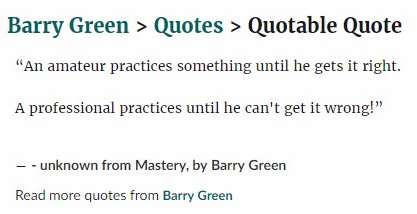
Learning things – especially mastering things – will take time. There’s no substitute for hard work.
Anecdote: Just Give Me a Chance…
As I share in a post titled It Costs Precisely $0.00USD to be Nice:
There was a time when I would have done almost anything to have recruiters reaching out to me almost daily. It wasn’t that long ago, actually – just a couple decades. I remember begging recruiters to just give me a chance! I knew I could do the work. I could learn anything and I have a strong work ethic.
When I was learning, I felt like it was taking forever to break into software development. Software was a hobby for decades before I landed my first job where my primary purpose at work was coding. Decades.
Part of the reason was the field of software development was relatively small in the 1970’s, 1980’s, and 1990’s – when compared with today. Landing a job almost always required a bachelor’s degree and I don’t have one. It was an obstacle.
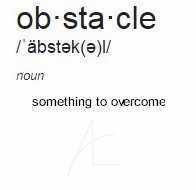
One Way: Suck it Up, Buttercup
That advice sounds crass, doesn’t it? There’s a good reason for that. It is crass. It’s also the best advice I can give you. No one who succeeded at anything quit. Not. One. Keep going. Don’t stop. Make the problems give up before you do.
Grant Cardone wrote a couple books every software developer should read listen to (he reads his audio books and they are awesome!): The 10X Rule and Be Obsessed or Be Average. In these books, Grant does an excellent job of explaining the dynamics of a successful work ethic. He has his detractors and critics (let me Google that for you…). I’ve not found one I consider successful (there’s more to success than making money).
“I Want What You Have”
Stop.
Stop right now.
Stop and figure out what you really want.
<Christian Material>
In other translations, the word “greed” is translated “covetousness.” Covetousness is wanting what someone else has. Of the seven deadly sins, only envy provides no pleasure for the person engaging in it.
Nada. Zero. Zilch.
Anecdote: We Are Different
If you feel someone doesn’t deserve some thing that they have – be that thing a relationship, success, knowledge, what have you – you are making a judgment for which you are most likely utterly and completely unqualified to make.
If you’ve ever experienced someone wanting what you have, you may have felt compelled to share that they should do what you’ve done to earn what you have.
I know I did when it happened to me.
This is pride. Pride is even more deadly than covetousness. Pride is the root of all sin.
It took me a chunk of years to realize that people are people. People believe what they believe for a reason. People have different experiences. That individual who irritated you to no end on social media earlier? That one you unfollowed? That person had experiences that led them to believe their way of thinking is better – makes more sense – than your way of thinking.
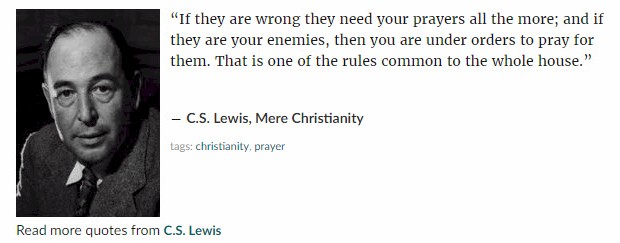
I’m not saying you should love your enemies or pray for them.
Jesus said that.
I’m quoting Jesus.
One Way: Let It Go
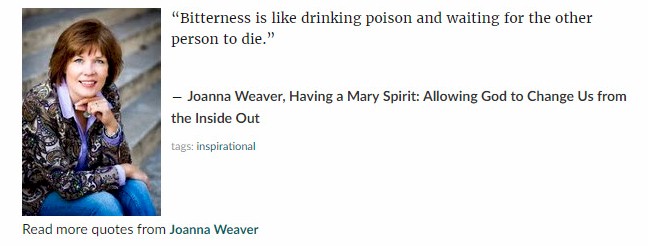
This is way easier to type than to practice. Joanna Weaver got this right: “Bitterness is like drinking poison and waiting for the other person to die.” You are as utterly unqualified to fix this issue in others as you are to judge it.
Let it go.
</Christian Material>
“Play Nice Well With Others”
If I had a nickel for every developer community post I’ve read about soft skills, I’d have a lot of nickels. I think the reason there are so many posts about soft skills is because we need to read them. Many such posts extol the virtues of “playing nice with others.”
I get it. I promise I do.
Anecdote: Fighting to Win Well
During my half-century+ on this earth, I’ve shared the concept of fighting well with a few people. Which people? Their names don’t matter. They shared a fiercely-competitive nature. There’s nothing wrong with being competitive. I am competitive. It’s the target of one’s competition that’s important.
I like – and agree with – Tim’s tweet:
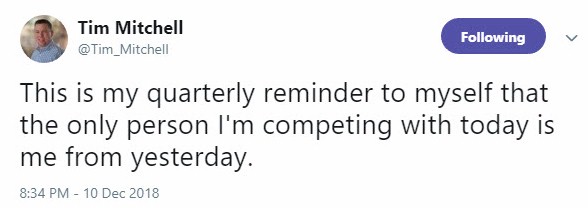
Fighting well is playing un-nice with others, at least some of the time.
Fighting well is taking a risk for what you believe in.
Fighting well is saying in response to, “You should pick your battles,”
“I choose this battle. This one. Right here. Right now.”
Fighting well is taking a stand.
Fighting well isn’t shutting down – or shouting down – the opposition.
Fighting well isn’t deflecting, answering questions not asked, controlling the narrative, deflecting, negotiating, manipulating.
Fighting well isn’t winning at all costs.
Fighting well is not fighting to win.
Fighting well means sometimes you lose.
One Way: Love People
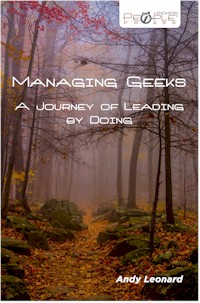
I wrote a book – based on a series of posts on this very blog – about Managing Geeks. It’s more of a diary than a how-to book. I was mentored by the aforementioned Ben McEwan and former business partner Brian Moran in the art and science of management.
I remember one conversation when Ben asked me, “What are you doing to these people?” He was referring to my team. If you’ve ever been mentored you may have experienced the same reaction I did, My first thought was, “Great. What did I mess up this time?”
But it wasn’t that kind of conversation (although we had many conversations about how I messed up…). It was a genuine question where the student took the teacher’s seat for a minute. (Note: all good mentors learn from their mentees…). He continued, “They will kill themselves for you.” Ben wanted to know how I inspired the team to follow me.
My response? “I love them.”
Servant leadership is now popular in the culture of business, but it has its roots in Christian faith communities. That’s where I learned it.
Fighting well means loving the opposition.
If I love you, I want the best for you.
Does that mean I’m going to capitulate? Not always. Sometimes what you want is not best for you. Sometimes I am in a position to know; to judge with wisdom. This is why we should respect our elders; they’ve lived longer and experienced more. Am I always going to be right just because I’m older? Goodness no! But I’m not always wrong just because I’m older, either.
I postulate experience matters but I balance that with fighting well.
Conlusion
These aren’t all the pitfalls for software developers but this post is long enough. Here’s hoping it helps.
Peace.


Andy great article. I forward it on to my kids. However I started to watch your blog for SSIS. Like to see more SSIS and Docker posts. Keep up the good work!
Hi Mark,
Thank you for reading my blog! Thank you for your kind words.
There’s a lot more SSIS-related stuff in the pipeline. I’m glad to hear you’re liking the Docker posts too.
My January pipeline is filling up fast. There are some cool Enterprise Data & Analytics announcements, more ADF, new releases of DILM Suite tools (although I’ve started the DILM Suite blog at https://dilmsuite.com/blog), more Docker, more… technical stuff I would rather not share until some of the announcements are made.
Merry Christmas!
*<:{>